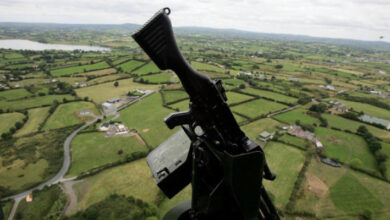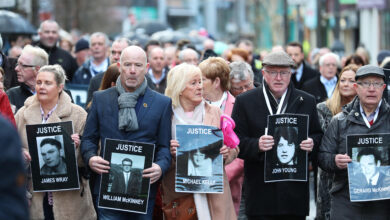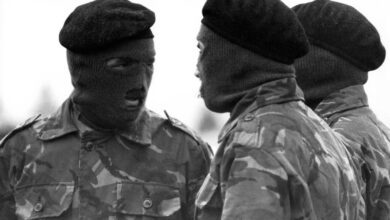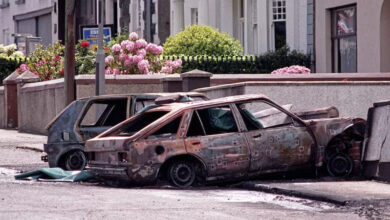Parla il ferito di Antrim. La notte in cui mi hanno crivellato a Massereene Barracks

Exclusive: The night I was riddled with bullets at Massereene Army barracks
On March 7 two young men died and several others were critically injured when dissident republicans launched a lethal and indiscriminate gun attack on Massereene Army barracks. Now, for the first time, one of the survivors has talked about the atrocity – and its painful, traumatic legacy.
 Marcin doesn’t remember everything about that fateful night back in March.
Marcin doesn’t remember everything about that fateful night back in March.
But what he does recall has left him prone to nightmarish flashbacks and terrifying panic attacks.
And he certainly won’t forget the six long, painful months of recuperation after dissident republicans pumped at least five bullets into his body.
But, despite all that, the 30-year-old Polish man said he was “a very lucky guy” because, had it not been for some kind of miracle that Saturday night, Marcin would have died in the hail of gunfire that took the lives of young English soldiers Mark Quinsey and Patrick Azimkar.
The dreadful bloodbath outside Massereene Barracks on March 7 stunned a Northern Irish public which, up until then, had been enjoying a decade of peace and relative tranquillity, free from paramilitary atrocities.
But all that was shattered when Real IRA gunmen revealed their lethal intent — and Marcin, who had been delivering pizza to the Co Antrim Army base, was caught in the crossfire.
Sitting in the front room of his Antrim home with fiancee Marta and their 21-month-old son Mateusz, the migrant worker from Radom in central Poland recalled the unmitigated horror of the night that changed his life — as well as coming perilously close to ending it.
“I remember seeing soldiers running into the barracks and away from the bullets,” he said.
“I didn’t see that much because I collapsed on the ground. I think I lost consciousness for a few seconds. What I remember about waking up was the unbearable pain. I was trying to work out what was happening. I was lying focusing on myself. By then I knew I had been shot, and I was wondering if I was going to survive.
“When I first heard the shots I thought it was fireworks, and then I saw the soldiers running around and I realised it was some kind of attack and I hid behind a car. Then I just woke up in pain on the ground. I didn’t realise what had happened to the other people at all.
“I heard the shots and saw the bullets bouncing off the gate. I was terrified at that stage. I had only one thing on my mind then, and that was to pull through. I didn’t know what injuries I had, but I was thinking about my girlfriend, about my son.”
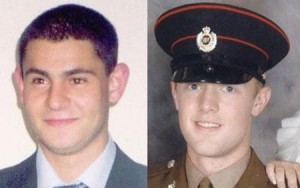
“At one point I was in so much pain I closed my eyes — not because I wanted to die, but I wanted to lose consciousness,” he said.
“Then I thought ‘if I close my eyes I will die’, and I had images of Martha and Mateusz — and I said ‘I can’t, I can’t’.”
Even today Marcin — whose surname we have withheld at his request — doesn’t know how many times he was shot. One bullet tore through his lungs, collapsing both of them. Bullets or shrapnel (he’s not sure which) were embedded in his feet. Another bullet pierced his spleen.
“No, I don’t actually know how many bullets hit me… at least five, but maybe more,” he said.
Yet somehow Marcin remained conscious when rushed to Antrim Area Hospital for what would be a traumatic nine-week stay, the first few crucial days of which were spent in intensive care while his life hung in the balance.
He underwent two major operations, one of which was an extensive skin transplant. However, the pain was so excruciating he had to be put under anaesthetic every time his wounds needed redressed. He now has a colostomy bag. “This is my toilet,” he said, lifting his shirt to show me.
“I’ve always loved swimming, but now I can’t go to the pool.
“My body is covered with scars and I’m in pain. This is the constant reminder of what happened. It’s difficult to forget, but I hope I will get used to it through time and cope with it.
“It was very hard to be in hospital for so long. I couldn’t see my family, I couldn’t walk, that was horrible for me.”
It was from his hospital bed that Marcin asked Marta to marry him. She answered with a resounding yes, and their wedding will be held in Poland next year. They are both native Poles, but as Marta is from Sosnowiec in the south-west they might never have met had they not come independently to Northern Ireland.
“The first thing I said to Marta when I regained consciousness in the hospital was: ‘I’m so uncomfortable, I’m tired, everything hurts. Don’t go anywhere’.
“The second thing was: ‘We’re leaving this place (Northern Ireland) right now’. For a short time I was uncomfortable living here, but it passed.”
Referring to the timing of his proposal, he joked: “I was very clever. She couldn’t say no — it was the week after the shooting.”
Making deliveries for Domino’s Pizza was a secondary job for Marcin. He was already employed by Tesco in its Antrim warehouse, but had to take on extra work after Marta was made redundant from her sales job in Belfast. He had been employed with Domino’s for only five weeks when he was gunned down.
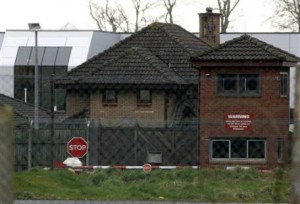 He said he would like to go back to doing pizza deliveries but Marta doesn’t want him to. His long-term injuries will preclude him from warehouse work in the future. His doctor has told him not to expect a complete recovery, and that worries him.
He said he would like to go back to doing pizza deliveries but Marta doesn’t want him to. His long-term injuries will preclude him from warehouse work in the future. His doctor has told him not to expect a complete recovery, and that worries him.
“I have flashbacks every day,” he said.
“When Marta and Mateusz are around me they distract the bad thoughts, but if I’m home alone they intensify.
“There are panic attacks and I find it very difficult to sleep because I have certain medical conditions I’m worried about. I don’t think I’ll ever be 100% fit again.”
He added: “I think about what happened, what could happen and how this is going to affect my life in the future. I think about that a lot these days. I don’t hate the people who did this to me. I feel sorry for them,” Marcin said.
“If I met the people who shot me I would just ask them if it feels good to be a murderer.”
Four uninjured soldiers travelled with him to the hospital that night. They later sent him a letter. One, called Dave Smith, said he would never forget Marcin’s words in the ambulance — “I’m a pizza man; I love my job.”
“They held my hand and they talked to me, and I would like them to know I remember them and I want to thank them for what they did for me,” Marcin said.
“I would also like to thank the medical staff at Antrim Area. They were amazing, as were the nurses in the intensive care unit.”
Marcin is now waiting to find out if he needs another operation. Despite the repercussions of the terrifying attack and painful recovery process, he will stay in Northern Ireland.
He said he will try to get some qualifications in order to find a job, but he hopes to become a commercial driver.
“I’m optimistic about life. At the end of the day I survived,” he said. “I’m still alive — and what doesn’t kill us makes us stronger.”
Two men — Colin Duffy and Brian Shivers — have been charged with the murder of the two soldiers and the attempted murder of five others, including Marcin. They are awaiting trial.
The interview was conducted in English with occasional assistance from a Polish interpreter.
Emotional visit from soldier’s girlfriend
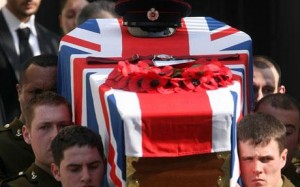 The girlfriend of one of the murdered Massereene soldiers had an emotional meeting with Marcin shortly after the shooting, it can be revealed.
The girlfriend of one of the murdered Massereene soldiers had an emotional meeting with Marcin shortly after the shooting, it can be revealed.
Louise — whose partner, Patrick Azimkar (21) was one of two soldiers who died in the gun attack — visited the injured Pole in Antrim Area Hospital, accompanied by her parents.
And, according to Marcin’s fiancee Marta, it was a heart-wrenching moment that reduced the 30-year-old to tears.
“It was so traumatic,” Marta said.
“There are no words that can be good at a time like that, or make the situation less painful.
“I found it very distressing because I realised I could be in her place.
“Marcin was trying to say something, but he couldn’t. He just started crying — but he doesn’t remember them visiting now.”
Marcin’s mother and father, who has a heart condition, travelled to Northern Ireland from central Poland to be with their only son during the dark days and nights following the attack.
But Marcin said his biggest crutch throughout the whole ordeal was Marta — to whom he had been intending to propose on a planned holiday to Poland — and their young son Mateusz.
“Having Marta by my bedside was really, really important and significant for me,” he said.
“She really helped me by just being there and it gave me courage to fight on.”
Sapper Azimkar, from London, and Sapper Mark Quinsey (23), from Birmingham, were shot dead just hours before a scheduled departure to war-torn Afghanistan.
Two delivery men including Marcin and two other soldiers were wounded in the Real IRA ambush, as two masked gunmen crossed the road and fired directly down at the badly injured men as they lay on the ground.
Just 48 hours later PSNI officer Stephen Carroll was shot by the Continuity IRA, prompting widespread revulsion and mass rallies in Belfast, Londonderry, Newry, Lisburn and Downpatrick.
Marcin, who came to the province aged 27 in search of a better life, said he was well aware of our turbulent history.
“I did realise about the terrible past of Northern Ireland and the conflict between Catholics and Protestants, but I thought it was over,” he said.
“I thought people were getting on with their lives. My main motivation was to come here and get work.”
And while he has paid — and will continue to pay — an enormous price for making that life-changing decision, Marcin said the public outcry and display of unity against the shootings brought some comfort.
“I have been in Northern Ireland for four years. What happened to me was a freak accident and it has not changed my opinion of Northern Irish people.”
He also said he knows not all of us are like that, that most people in Northern Ireland want to work together towards a better future for everyone.
“When I was in hospital I was suffering a lot, so I wasn’t taking on board that much,” he said.
“But, at the same time, in all of this it is good that people united and went on the streets in protest about what happened, because at the end of the day two soldiers lost their lives.
“This was murder. What excuse can someone give for murdering someone else? There is no justification.”

